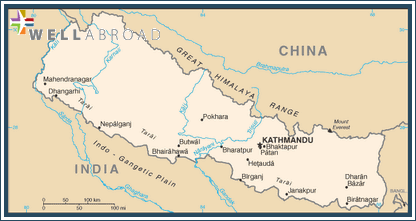|
MOST RECENT ALERTS
There's no recent alert.
|

|
|||||||||||||||
| COUNTRY OVERVIEW | ||||||||||||||||
|---|---|---|---|---|---|---|---|---|---|---|---|---|---|---|---|---|
|
| COUNTRY GENERAL INFORMATION | |||||||
|---|---|---|---|---|---|---|---|
| Language: |
Nepali 47.8%, Maithali 12.1%, Bhojpuri 7.4%, Tharu (Dagaura/Rana) 5.8%, Tamang 5.1%, Newar 3.6%, Magar 3.3%, Awadhi 2.4%, other 10%, unspecified 2.5% note: many in government and business also speak English |
||||||
| Currency: | Nepalese Rupee (NPR) | ||||||
| Predominant Religions: |
Hindu 80.6%, Buddhist 10.7%, Muslim 4.2%, Kirant 3.6%, other 0.9%; only official Hindu state in the world |
||||||
| National Holidays: | |||||||
| Economic Status: |
Nepal is among the poorest and least developed countries in the world with almost one-third of its population living below the poverty line.
|
||||||
| Security: |
Royal Nepalese Army (includes Royal Nepalese Army Air Service); Nepalese Police Force
|
||||||
| US Presence: |
U.S. Embassy in Kathmandu
Embassy of the United States of America Maharajgunj, Kathmandu, Nepal Tel.: 977-1-423-4000 |
||||||
| Document Requirements: |
A passport and visa are required. Travelers may obtain visas prior to travel or purchase fifteen-day multiple-entry visas ($25), one-month multiple-entry visas ($40), or three-month multiple-entry visas ($100) upon arrival at Tribhuvan International Airport in Kathmandu and at the following land border points of entry: Kakarvitta, Jhapa District (Eastern Nepal); Birgunj, Parsa District (Central Nepal); Kodari, Sindhupalchowk District (Northern Border); Belahia, Bhairahawa (Rupandehi District, Western Nepal); Jamunaha, Nepalgunj (Banke District, Mid-Western Nepal); Mohana, Dhangadhi (Kailali District, Far Western Nepal); and Gadda Chauki, Mahendranagar (Kanchanpur District, Far Western Nepal). Visas and information on entry/exit requirements can be obtained from the Embassy of Nepal at 2131 Leroy Place NW, Washington, DC 20008, telephone (202) 667-4550 or the Consulate General in New York at (212) 370-3988. |
||||||
| Major Airports: |
Airports: 48, Airports w/paved runways: 10Kathmandu – Tribhuvan Airport (KTM/VNKT)Kathmandu Airport, Nepal, Kathmandu, NEPALTel: +977 (0)1 470274
|
||||||
| Servicing Airlines: |
|
||||||
| Risks and Precautions: |
US Dept of State Travel Warning NEPAL issued May 7, 2008 and was updated 22 May 2009. The Department of State warns US citizens of the risks of traveling to Nepal and urges caution when traveling in country. The Department of State remains concerned about the security situation in Nepal and urges American citizens to obtain updated security information before they travel and to be prepared to change their plans on short notice. This replaces the Travel Warning for Nepal dated November 21, 2008 and updates safety and security information. |
||||||
| Mortality Statistics: |
Infant MR total: 63.66 deaths/1,000 live births |
||||||
| Immunization Indicators: | |||||||
| Infectious Disease Concerns: |
Malaria risk area in Nepal: Risk in rural areas at altitudes below 1,200m (<3,937 ft) in the Tarai and Hill districts bordering India and in the areas of the inner Tarai valley areas of Udaypur Sindhupalchowk, Makwanpur, Chitwan, and Dang. No risk in Kathmandu or on typical Himalayan treks. Dengue fever has caused epidemics in most South Asian countries. Filariasis is common. A sharp rise in the incidence of visceral leishmaniasis has been observed in several South Asian countries. Japanese encephalitis occurs widely except in mountainous areas of South Asia. Indigenous wild polio was present in 2005-2006 in India, Pakistan, and Afghanistan; cases from Bangladesh and Nepal were confirmed in 2005-2006. Measles occurs in the South Asia region and can be a source of infection for unvaccinated travelers.
|
||||||
| Overall Quality of Medical Services: |
Medical care in Nepal is extremely limited and is generally not up to Western standards. Typical travelers' complaints can be addressed by the clinics in Kathmandu, and some surgeries can also be performed in the capital.
|
||||||
| Providers in Network: |
|
||||||
| Recent Medical Threats/ Concerns/Warnings: |
Highly pathogenic avian influenza (H5N1) continues to cause outbreaks in domestic and wild bird populations and has caused human cases in several South Asian countries. Avoid all direct contact with birds, including domestic poultry (such as chickens and ducks) and wild birds, and avoid places such as poultry farms and bird markets where live birds are raised or kept.
|
||||||
| Communications Info: |
Country Calling Code: +977 |
||||||






